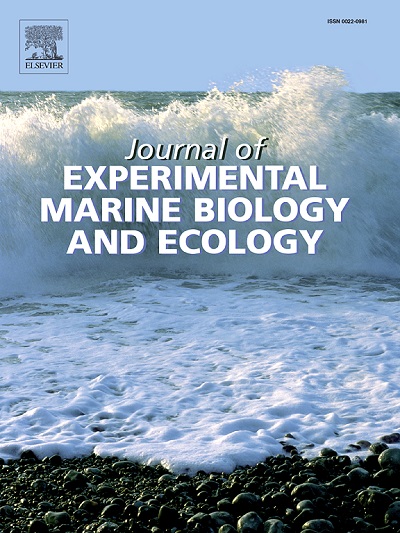Toxic impact of aluminium on the natural phytoplankton community during spring in the Atlantic sector of the Southern Ocean
IF 1.8
3区 生物学
Q3 ECOLOGY
Journal of Experimental Marine Biology and Ecology
Pub Date : 2025-07-12
DOI:10.1016/j.jembe.2025.152119
引用次数: 0
Abstract
The natural Southern Ocean phytoplankton community plays a pivotal role in both the marine trophic chain and global climate regulation. Previous studies and models have primarily focused on the individual effects of iron (Fe) on phytoplankton, often overlooking the potential toxic impact of aluminium (Al) and its interactive effects with Fe and cobalt (Co). Here, a series of controlled incubations involving the addition of trace metals (Al, Fe, and Co) were conducted to evaluate the potential effects of these elements in the Polar Frontal Zone and the Marginal Ice Zone. The findings revealed that the introduction of 1 nM of Al prompted a reduction in biomass of the entire natural community, coupled with a decrease in the photosynthetic efficiency (Fv/Fm) and an increase of the absorption cross-section of photosystem II (σPSII). A similar toxic impact of Al addition was observed at both sites, however, the level of cell activity and presence of other micronutrients (Fe, Co) attenuated the toxicity to some extent. Despite its connotations, Al toxicity is not considered an immediate threat to the sub-Antarctic phytoplankton community, however, the scenario could differ in regions where increased lithogenic input is likely.
铝对春季南大洋大西洋海域天然浮游植物群落的毒性影响
南大洋天然浮游植物群落在海洋营养链和全球气候调节中发挥着关键作用。以前的研究和模型主要集中在铁(Fe)对浮游植物的个体影响上,往往忽略了铝(Al)的潜在毒性影响及其与铁和钴(Co)的相互作用。在这里,进行了一系列涉及添加微量金属(Al, Fe和Co)的受控孵育,以评估这些元素对极地锋面区和边缘冰带的潜在影响。结果表明:1 nM Al的引入导致整个天然群落生物量减少,光合效率(Fv/Fm)降低,光系统II吸收截面(σPSII)增加。在两个部位观察到添加Al的毒性影响相似,然而,细胞活性水平和其他微量营养素(Fe, Co)的存在在一定程度上减弱了毒性。尽管其内涵,铝毒性不被认为是对亚南极浮游植物群落的直接威胁,然而,在可能增加岩石成因输入的地区,情况可能有所不同。
本文章由计算机程序翻译,如有差异,请以英文原文为准。
求助全文
约1分钟内获得全文
求助全文
来源期刊
CiteScore
4.30
自引率
0.00%
发文量
98
审稿时长
14 weeks
期刊介绍:
The Journal of Experimental Marine Biology and Ecology provides a forum for experimental ecological research on marine organisms in relation to their environment. Topic areas include studies that focus on biochemistry, physiology, behavior, genetics, and ecological theory. The main emphasis of the Journal lies in hypothesis driven experimental work, both from the laboratory and the field. Natural experiments or descriptive studies that elucidate fundamental ecological processes are welcome. Submissions should have a broad ecological framework beyond the specific study organism or geographic region.
Short communications that highlight emerging issues and exciting discoveries within five printed pages will receive a rapid turnaround. Papers describing important new analytical, computational, experimental and theoretical techniques and methods are encouraged and will be highlighted as Methodological Advances. We welcome proposals for Review Papers synthesizing a specific field within marine ecology. Finally, the journal aims to publish Special Issues at regular intervals synthesizing a particular field of marine science. All printed papers undergo a peer review process before being accepted and will receive a first decision within three months.

 求助内容:
求助内容: 应助结果提醒方式:
应助结果提醒方式:


